2020 is drawing to a close. It’s been a year that began with floods that devastated towns in the Rhondda, that brought with it a pandemic, and is now ending on a Christmas period that for most will be very different to any that came before.
But disaster has brought out the very best in some, and all year we’ve seen inspiring people lead the charge toward a better future. Here are three groups doing just that in Cardiff and beyond.

When lockdown began in March, those not designated as essential workers had to get used to staying indoors. Depending on your situation, this may have meant juggling home working with restless children and boisterous pets, an extra chunk of reclaimed time in the absence of a commute, and for some, a general sense of isolation and loneliness.
For some, though, the story was even more complicated.
Transgender and non-binary people are among the most vulnerable groups living in Britain. In a 2017 survey, one in four trans respondents reported experiencing homelessness at some point in their lives, 41% had experienced a hate crime or incident within the past year (31% for non-binary people), and more than a quarter of those in a relationship had experienced domestic violence.
Almost half of trans people living in Britain have attempted suicide at least once.
Lockdown meant being trapped indoors with an abusive partner for some trans and non-binary people, or for trans youth, with unsupportive family members, cut off from the friendship groups and social spaces in which they could be themselves.
As noted in recent report by LGBT Youth Scotland, the public were encouraged to seek support from community during lockdown, but when asked if they felt included in their local community, just 35% of young trans people said they did.
This summer Shash Appan, 24, founded the Trans and Non-Binary Mutual Aid Network with some friends and fellow activists, to address the need that they could see in their community.

Shash is an experienced acitivist, a member of the Glitter Cymru support group for queer BAME people in Wales, and runs the ‘All T*, No Shade’ Facebook group for trans people in Cardiff, the Vale and the Valleys.
She explains that the group felt let down by the government and by politics, after planned reforms to the Gender Recognition Act, which would have simplified the process of updating personal documentation for trans and non-binary people, were scrapped.
“Politics in general doesn’t accommodate trans people. It’s not like they’re going to fight for us any time soon. We decided we needed to help trans people now, and what better than trans people doing it for trans people? It just kind of grew from there.”
One of the functions of the mutual aid network is to help trans people raise money to access private healthcare.
Waiting lists for NHS gender identity clinics are notoriously lengthy, which takes a severe toll on the mental health of those seeking treatment. At the time of writing, the approximate wait for an appointment in Cardiff is 30 months.
Funds also go towards covering the general living costs of vulnerable trans and non-binary people, who often face extreme barriers to obtaining secure employment and housing, as well as providing access to a councillor.
“A lot of people don’t realise, when they hear about the struggles of trans people – It’s not just the medical or transition-related stuff, it’s that daily-living becomes such a struggle.”
Shash says the group will often act as a ‘personal assistant’ for their service users, helping them to fill-out Universal Credit and housing benefit applications, making phone calls and booking appointments on their behalf, and signposting them to other support services where needed.
“A lot of people are struggling, they have so much stress and disorder in their lives that the executive dysfunction is overwhelming, and so they can’t even send an email out to ask for help sometimes.”
The network also runs a ‘trans wardrobe’ which collects and distributes clothing donations to the Cardiff community, and has created a map of trans-friendly GPs across Wales.
On Christmas Day they’ll be holding an online Zoom social for trans, non-binary and intersex people who are spending Christmas alone.

The group has big plans for the New Year. They’re registering as a Community Interest Company so that they can access funding grants, and they’ll be rebranding under the simplified name of Transaid Cymru. They’re also looking to start up a series of educational workshops.
The workshops will range from building self-esteem through therapy, to practical skills like ‘make do and mend’ sewing, as well as budgeting. All being well, the first workshop will begin in early January.
Shash says that this year has opened her eyes to suffering in her community that even she was unaware of.
“One person said they didn’t have clean water.
“It’s not that we’re a privileged bunch either, we’ve been through a lot, but hearing how low it can go is really saddening, but I’m glad that we’re there to help.”
While running the network has been stressful, Shash says it’s been highly rewarding to see the difference it’s made.
“A lot of the service users, as we call them, they’re resilient and very adaptable people. They’ve been through so much in a way that they’ve learned to survive, and a lot of what we’re trying to do is to stop them from having to survive day to day, and actually be able to live and thrive.
“I know in my past at least, surviving day to day was the constant focus, and helping trans people to find some sort of meaning in their lives.. That’s the hope, essentially. “
You can donate to the South Wales Trans and Non-Binary Mutual Aid Network here.
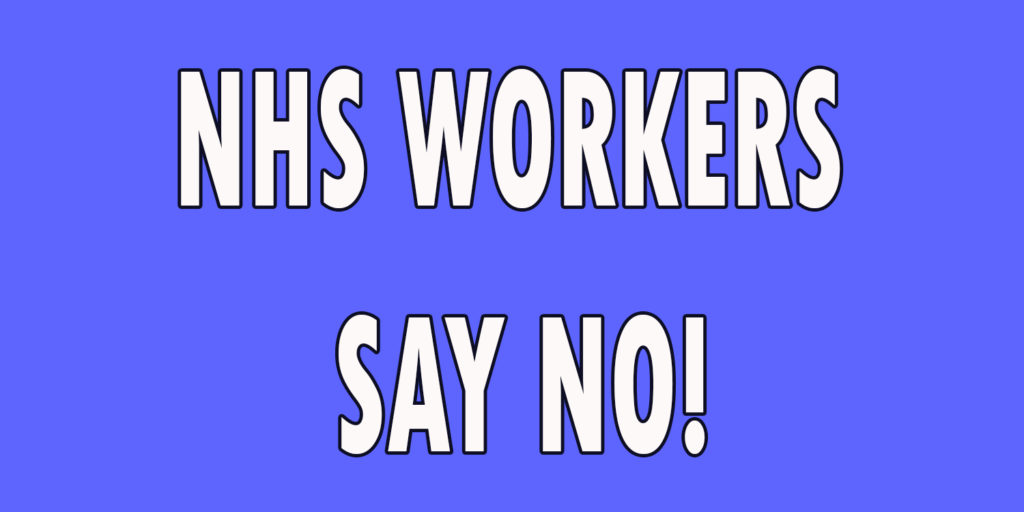
On Thursday 26th March this year, people across Britain stood on their doorsteps, in their gardens and open windows, and took part in the first ever Clap For Carers. The clapping became a weekly ritual for most, an act of appreciation and solidarity for those working on the frontline of the pandemic which carried on until the early summer.
The last official Thursday evening Clap for Carers took place on 28th May.
Just two months later, UK Chancellor Rishi Sunak announced a series of modest pay-increases for public sector workers. Excluded from the deal were nurses, midwives, hospital porters, and other NHS staff. Social care workers would also miss out.
In response, the NHS Workers Say No! campaign was launched by those NHS staff excluded to fight for a 15% pay increase and an end to public sector pay inequality, with the backing of major trade unions.
In Cardiff, a powerful protest was held outside the Senedd, where flowers were laid to remember the NHS and care staff that had passed away during the brutal first wave of the coronavirus.
Similar protests were held across the country, and Rhian, a nurse in emergency medicine, who has worked for the NHS for around nine years, put one together in Merthyr, alongside fellow nurse Matthew Tovey.
“The pandemic has been one of the worse experiences of my life. I contracted Covid at the start of April and couldn’t come home for my daughter’s fourth birthday.
I was 25 miles away, scared, frightened, and alone. It’s been long and it’s not showing any signs of ending.”
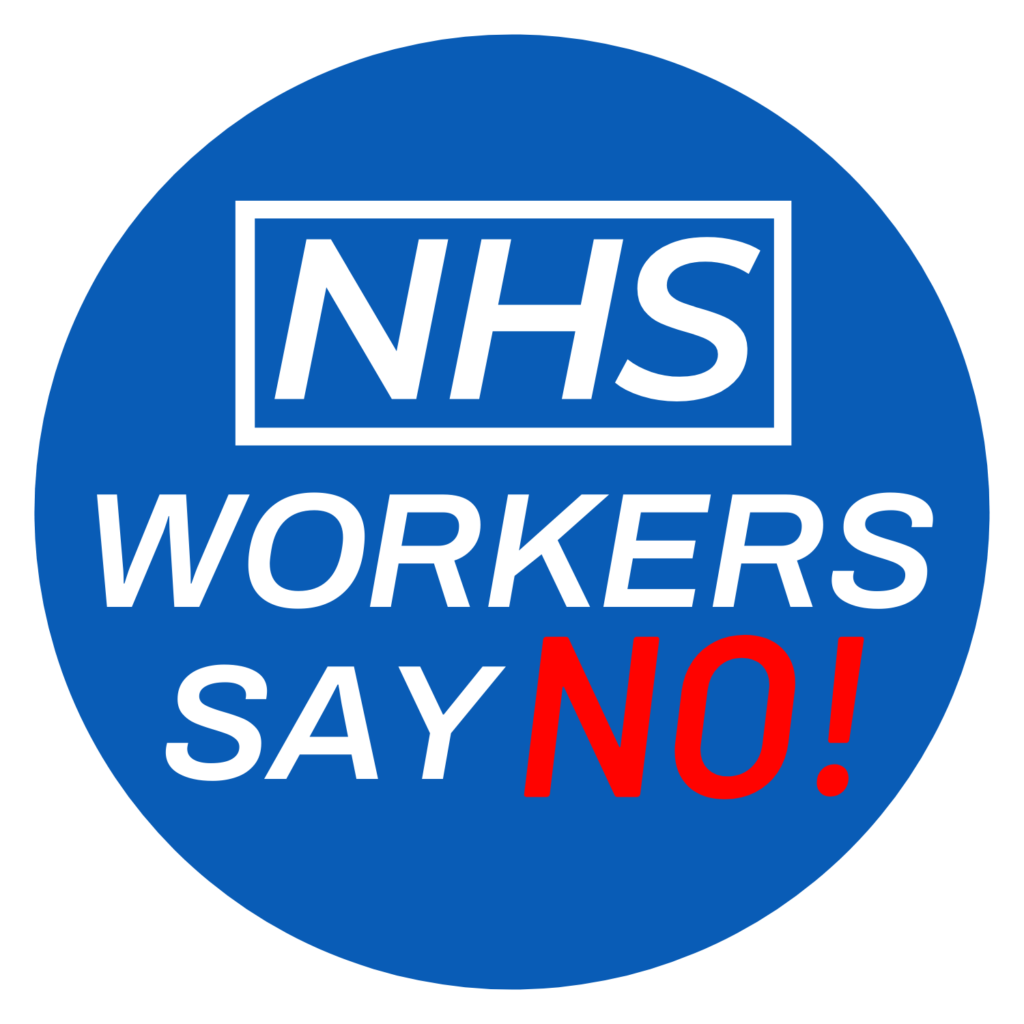
2020 has been a tough year for NHS and care workers. From those emptying bins to those fitting critically-ill patients with ventilators, staff have worked long and exposed hours.
At least 198 frontline health and care workers are known to have died from Covid this year, and in August, The Independent reported that medical examiners were investigating the deaths of more than 620 people that worked in those sectors.
The latest data published by the Office For National Statistics show that the covid death-rates for people working in health and care settings were significantly higher than in the general population.
Among the worst affected during the pandemic were BAME health and social care workers – Filipino nurses in particular make up 3.8% of NHS nursing staff, but accounted for 22% of deaths in the nursing workforce.
Rhian had never done any campaigning before organising the protest in August, and was pleased with the support that the campaign seemed to get.
“We had a lot of help from the local town, Merthyr town centre shops supported us massively, as well as Charlotte, a reverend of the local church.
“Everyone has been incredibly supportive, and the public appear to be backing us, which is always great. In Merthyr, our local AMs and MPs have met with us and stated they back us. Beth Winter in RCT has been incredibly supportive.”
Nurses and other NHS were left out of this year’s pay rise because of a three-year pay deal that started back in 2018.
Analysis by the Institute for Public Policy Research, however, found that this deal did not make up for the real-terms pay cut inflicted on NHS workers by the public sector pay freeze. According to GMB Union, the average long-serving NHS cleaner will have lost £2,906 by April 2021.
For a staff nurse, that figure will be £5,943.
“In real terms, we’ve taken a pay cut of 20%, in line with inflation, so 15% would bring us back into line with inflation. It would allow me to not have to work extra shifts, my colleagues wouldn’t need to rely on food banks, or be living in poverty.”
ITV News reported a survey of over 3,000 NHS nurses across the UK by Nursing Notes and Nursing United found that 64% of respondents had been working overtime to pay bills, and 39% had skipped meals over the past 12 months to save money.
In spite of the strain of stagnating wages, Rhian loves her job.
“I have always loved my job. It’s a privilege to care for someone, to hold their hand, brush their hair. Providing individuals with the highest quality of care is something I pride myself on.”
“The team I work with are outstanding and certainly make bad days better. I became a nurse to make a difference, to help others, and I’m so proud to be a nurse.
“Nothing can prepare you for telling a family bad news, or a patient, that’s always difficult. However, sitting with a person at that time and making sure they feel supported is always vital, no matter how difficult it can be.”
You can find out more about the NHS Workers Say No! campaign at their Facebook page.

The issue of free school meals (FSMs) made the headlines throughout this year. Manchester United football player Marcus Rashford has been leading a campaign to keep hungry children fed over the summer and Christmas school holidays, twice forcing the UK government to U-turn on attempts to halt FSMs at the end of term.
In a heartfelt open letter back in June, Rashford wrote about his mother’s struggle to put food on the table, despite working full-time, and implored the government to act on the behalf of the country’s most vulnerable.
“The system was not built for families like mine to succeed, regardless of how hard my mum worked.” he said.
“This is not about politics; this is about humanity. Looking at ourselves in the mirror and feeling like we did everything we could to protect those who can’t, for whatever reason or circumstance, protect themselves.”
Here in Wales, the government earned praise when Education Minister Kirsty Williams announced in October that FSMs would be provided during all school holidays up until Easter 2021.
Cardiff-based activist Adam Johannes, though, says that thousands of hungry children continue to be excluded from the Welsh Government’s free school meals provision, and has mounted a campaign with his group Cardiff People’s Assembly Against Austerity, to fight for universal free schools meals in Wales.
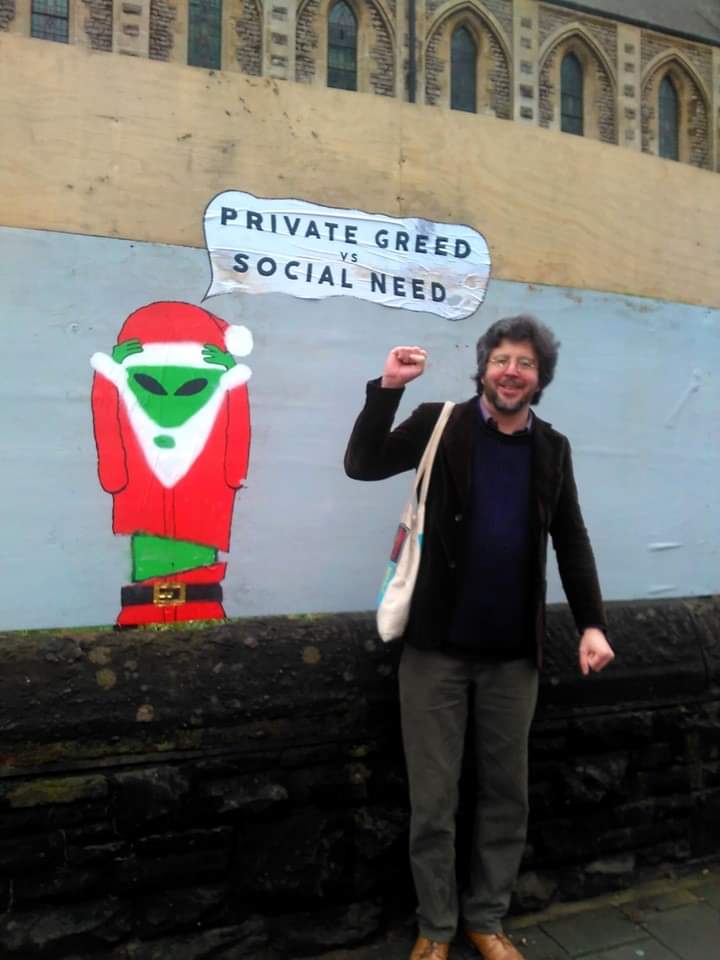
“I’ve been interested in the concept of universal free school meals for a long time, because it’s been the case for over 70 years in Finland, and I think it’s had a very humanising effect,” said Adam.
It was made mandatory for municipalities in Finland to provide free school meals for every child between the ages of 6-16 back in 1948. The country now prides itself on being a ‘world leader in nutritional expertise’.
“Every child at school is guaranteed at least one hot, nutritious meal up to the age of 16, and the fact that it’s universal means there’s no stigma around poverty and accessing free school meals. It has benefits on improving health, reducing the rates of child obesity, but also creates a healthier environment in the school.”
Research published by the Institute for Social and Economic Research this year found that the provision of universal free school meals to infant school children in England did indeed reduce the rate of obesity in those schools, albeit by a small margin (0.7%).
The same study found that those children that took up the available free school lunches showed stronger educational performance at ages five and seven.
“What really concerned us about the whole debate over holiday hunger, and in England, the stuff with Marcus Rashford. Because the Welsh Government have a holiday hunger programme, I think a lot of people thought the situation is okay in Wales, everything’s fine in Wales,” said Adam.
“I think people have this impression that Wales is one of the best in the UK on this, but actually research by the Child Poverty Action Group (CPAG) argues that Wales is actually the worst country in the UK for the provision of free school meals.”
In Wales, England and Scotland, families on Universal Credit and equivalent benefits are entitled to FSMs, but only if the household’s annual income is £7,400 or lower (the threshold is £14,000 in Northern Ireland). Unlike England and Scotland, however, Wales does not offer universal FSMs to infant school children.
An analysis by the CPAG in October found that over half of all children in poverty in Wales are not eligible for free school meals. This is usually because their parents work in low-paid jobs, taking them over the eligibility threshold. 72% of UK children growing up in poverty live in a working household.
Others are children of families with no recourse to public funds – the policy which prevents immigrants with limited leave to remain (for example, those in the country on work permits, for study, or to join family members that live in the UK) from accessing benefits.
Since the launch of its petition just over a week ago, the campaign has won the support of several prominent organisations in Wales.
A letter of appeal was sent out to every Senedd member calling on them to support amending the FSM eligibility criteria and to implement universal FSMs for infant school children.
Among the signatories were Oxfam Cymru, Samaritans Cymru, Big Issue, and the Child Poverty Action Group.
Plaid Cymru has also pledged their support, tabling a motion on Wednesday to take the first steps towards that goal. An ‘empty plate’ protest was held outside the Senedd before the vote was due to take place, but the motion was voted down by the majority of Senedd members.
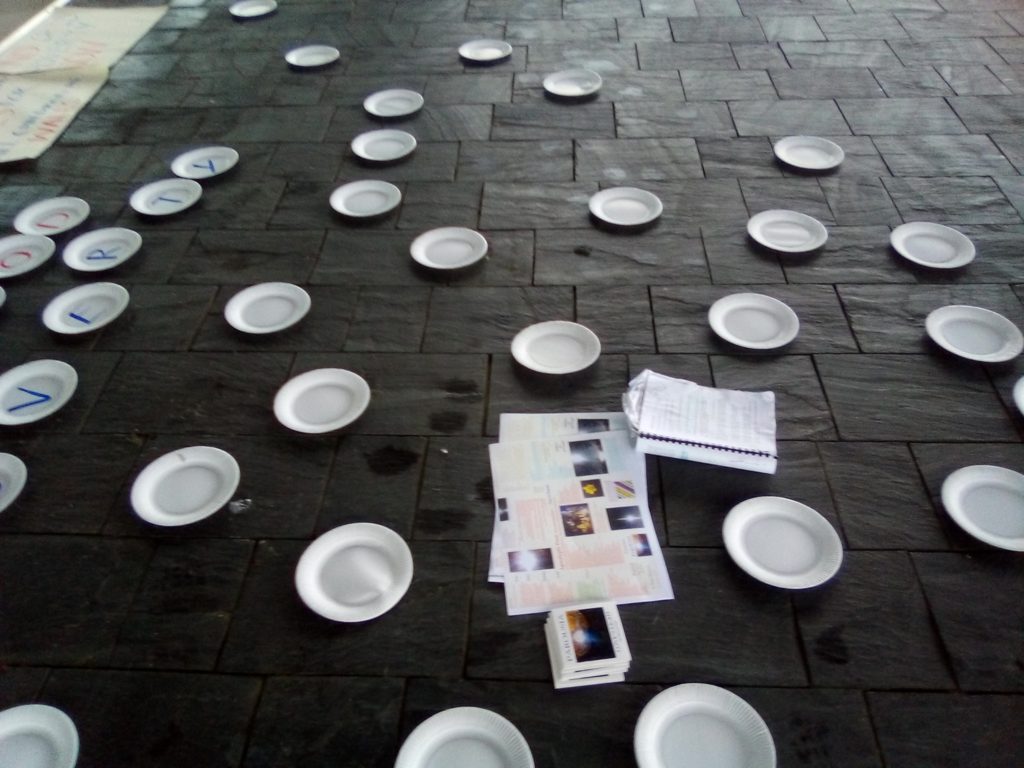
Education Minister Kirsty Williams said “Wales has the most generous per-head provision for free school meals of any of the UK nations; £52m has been pledged to ensure children continue to receive free school meals during the pandemic.
“While local councils have discretionary powers to support families who are on low incomes but not yet receiving benefits, the Welsh budget isn’t unlimited.”
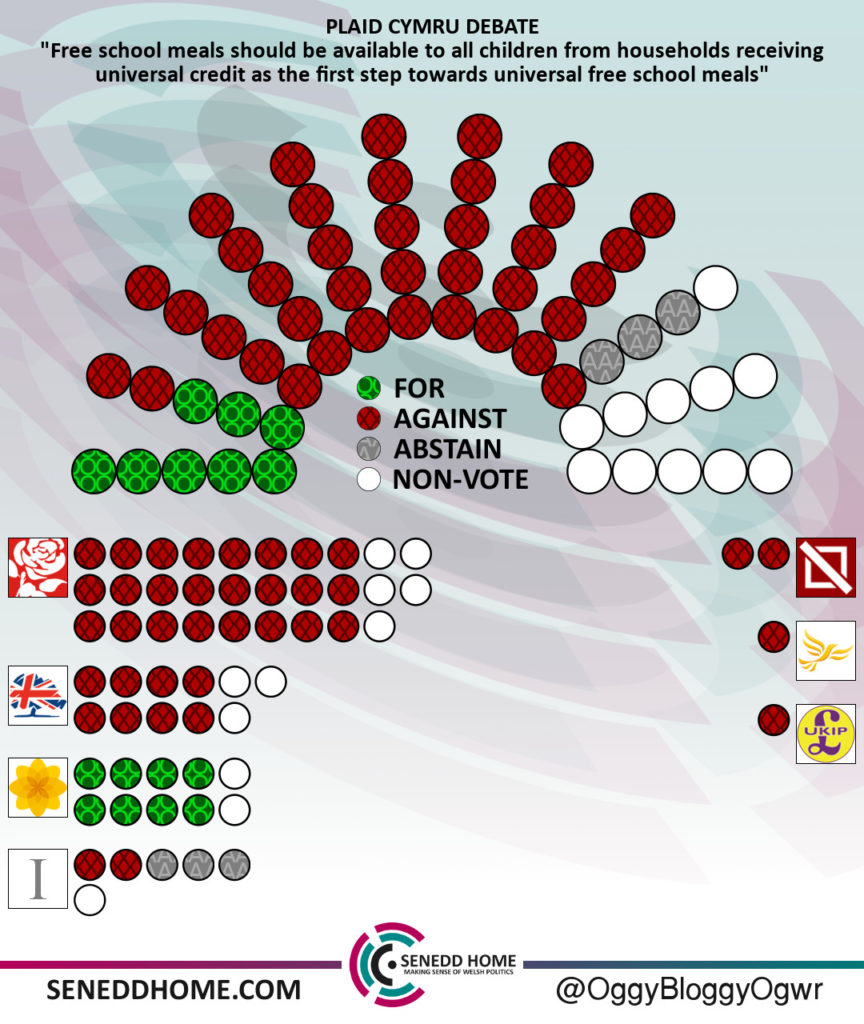
Though Adam was surprised that so many Labour Senedd members in particular voted down the motion, he remains optimistic.
“A lot of Labour party members and trade unionists are fully behind the campaign, and we’re confident we can start to build stronger support in the party.”
Adam, who grew up in poverty and relied on FSMs, hopes that the idea will become a talking point ahead of next year’s Senedd elections, but is wary of it becoming a ‘political football’.
“I’d like it to capture the public’s imagination, because it’s a very positive idea, a sign of hope.”
“We want to rebuild our safety net, and make society a much gentler, more humane place. Less dog-eat-dog, where basic needs are met.”
You can sign the campaign’s petition here.



